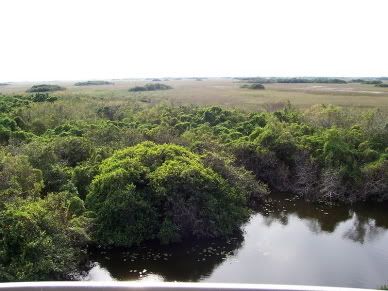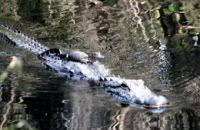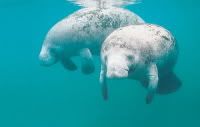By Lloyd Dunkelberger and Carol E. Lee
Naples News
April 29, 2008
After declaring that Florida's budget woes were so grim that they had to cut off funding for the restoration of the Everglades, legislative leaders quickly reversed themselves Monday, finding an extra $50 million to fund the massive environmental cleanup project.
Eliminating funding for the Everglades, even for a year, could have had far-reaching consequences for the long-term project.
"It would have sent a horrible message to Congress," said Eric Draper, a lobbyist for Audubon of Florida.
Even the last-minute decision to salvage 25 percent of the $200 million that the state spent on the project this year may still set back the state's efforts to get the federal government to pick up 50 percent of the cleanup tab, Draper said.
So far, the federal government has put up $360 million to the state's $2.4 billion.
"It is going to send a signal to the federal government that it is OK to slow down," Draper said. "I think it makes it easier for Congress to not appropriate as much money to the Everglades."
When lawmakers declared that they had settled the new $66 billion budget for 2008-09 early Sunday evening, they said the bill contained no money for the Everglades cleanup -- even though Gov. Charlie Crist had asked for $200 million for both the Everglades and nearby Lake Okeechobee.
But House budget chairman Rep. Ray Sansom, R-Destin, said the Everglades funding was an "unresolved issue" as of Sunday evening. House Speaker Marco Rubio, R-West Miami, and Senate President Ken Pruitt, R-Port St. Lucie, decided to move $50 million from a Department of Environmental Protection trust fund used to control invasive plants to the Everglades project.
"It was probably the right thing to do," Sansom said. "I think they made a good decision."
Some credit Crist for calling Rubio and Pruitt and making a plea for the project. Asked if he had had any influence on the decision, Crist said: "I hope so." He also said he was "enormously grateful" to the legislative leaders for funding both environmental projects and children's programs in the budget, which takes effect July 1.
Rep. Stan Mayfield, R-Vero Beach, who oversees environmental spending in the House, said he wanted to be able to fund more for the Everglades and Lake Okeechobee projects.
"I'm a little disappointed that we didn't get the other $50 million," he said, adding: "I think it'll be enough to keep the programs going and shouldn't have much of a detrimental impact to what we've got going."
Sen. Burt Saunders, R-Naples, chairman of the Environmental Preservation and Conservation Committee, said he disagreed with the assertion that the new budget reduces the Everglades funding by 75 percent.
In addition to the $50 million -- which is likely to be split between the Everglades and Lake Okeechobee cleanup efforts -- Saunders said the South Florida Water Management District will have about $229 million that can be used for projects in the Comprehensive Everglades Restoration Plan, which is eligible for the federal matching funds.
All together, Saunders said, Everglades funding may be a little lower next year than in previous years, but he said with the additional decision to fund $300 million in Florida Forever environmental land projects, environmental spending fared pretty well in a tough budget year.
"When you put it all together, I think the environment scored very well in light of where we have been with our budget," Saunders said.
Environmental lobbyists said many programs would face cuts in the new budget year.
Draper said he feared that, with only one-fourth of the current funding, the cleanup effort for Lake Okeechobee "will take that much longer" and more of the lake's polluted waters will flow into the St. Lucie and Caloosahatchee river systems.
"They have been seriously damaged by the lake's polluted water," Draper said. "That is just really going to set us back."
Draper said he was also disturbed by other cuts, including the loss of personnel at the Department of Community Affairs, which is the state's major planning agency, and deep cuts to other water projects.
"It's not a good year for the environment and it's particularly disappointing that we lost that much money out of the Everglades," Draper said.

Click the picture to visit the Friends of the Everglades website.
EVERGLADES PROJECT
The Everglades restoration effort is one of the largest and most ambitious environmental initiatives ever undertaken.
The basic aim of the project is to restore a more natural water flow to the 2.4 million-acre marsh, which is a critical habitat for many threatened and endangered species. The water restoration will also provide a reliable drinking water supply for millions of people in South Florida.
The central element of the cleanup effort is the Comprehensive Everglades Restoration Plan, a $10.9 billion restoration project covering 16 counties over an 18,000 square-mile area. Funding is expected to be split between the federal and state governments.
Additional cleanup efforts are aimed at Lake Okeechobee and the Caloosahatchee and St. Lucie river systems.

Wildwood Preservation Society is a non-profit 501(c)(4) project of the Advocacy Consortium for the Common Good. Click here to learn more.
"it's all connected"













No comments:
Post a Comment